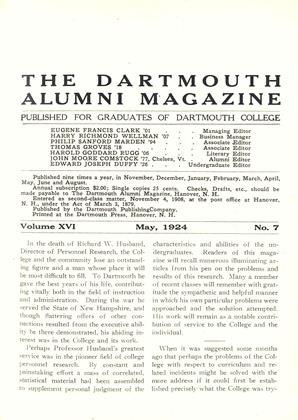RECOLLECTIONS OF DR. LEEDS
To the Editor : In the very interesting articles by Mr. Powers on "Dartmouth in the Seventies" there is one statement which, with your permission, I should like to correct. I knew Dr. Leeds intimately for many years, and I realize that to a student who heard him preach, the absence in his sermons of controversial theology or doctrinal argument, so common in that day, migjit well give the impression that he "was satisfied with the belief of the fathers, and was not easily led astray by new views on theological questions." The truth was that he laid so much more emphasis on principles than on dogmas, on the teachings of Christ than on creeds or formulas, that he considered it a waste of opportunity to preach on the latter, and was always pained by the heated arguments of the theologians of that time. I well remember the Sunday after the famous heresy trial during the "Andover Controversy," when even in Hanover there was much feeling on the subject of future probation. Everyone expected a sermon on the question of the day, and there was a hush when Dr. Leeds read his text "One said unto him, Lord, are there few that be saved? And he said unto them Strive to enter in at the strait gate, for many, I say unto you, will seek to enter in and shall not be able." There was no further reference to doctrine or heresy, as he went on to discuss, as usual, the need of personal religion.
Many of our church members might have been surprised to know what a "Modernist" he was, for he did not force his own views on other people, but his extraordinarily active mind was awake to all the new scientific and critical theories, and he had no trace of fear in his search for the eternal verities. As a child I once went to him with a knotty problem from the Old Testament, and in a few moments he so simply explained how the Lord had worked always through the minds of more or less ignorant men, that, ever since I have wondered why anyone should be worried about "Higher Criticism." He was an omnivorous reader with a wonderful memory, and his knowledge of mathematics and of poetry were alike remarkable.
I think the students generally thought Dr. Leeds' sermons "dull." The older people said he preached "over their heads," but no one in difficulty ever found him, too busy to listen. No one will ever know how many poor students he helped through college, or how manypersons he aided by a generous gift from his meagre salary. Even when it was discovered that he had "loaned" something to a village ne'er do well, he laughed and only said "I am sorry for the man who has never thrown away any money!"
Permit me to congratulate you on the excellent reproductions of old photographs. They should be laid away with the History of the College, for they make to live again some quite remarkable personalities.
I am, Sir Respectfully yours,
 View Full Issue
View Full Issue
More From This Issue
-
 Article
ArticleTHIRTY YEARS OF ALUMNI REPRESENTATION ON THE BOARD OF TRUSTEES
May 1924 By James Fairbanks Colby '72 -
 Article
ArticleFROM THE UNDERGRADUATE CHAIR
May 1924 By F. L. Janeway -
 Article
ArticleDARTMOUTH IN THE SEVENTIES III
May 1924 By Samuel L. Powers '74 -
 Article
ArticleIn the death of Richard W. Husband
May 1924 -
 Article
ArticlePROFESSOR RICHARD WELLINGTON HUSBAND
May 1924 By Charles Darwin Adams -
 Class Notes
Class NotesClass of 1903
May 1924 By Perley E. Whelden







